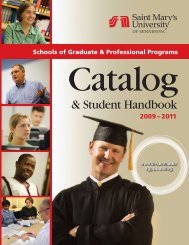PDF version - Saint Mary's University of Minnesota
PDF version - Saint Mary's University of Minnesota
PDF version - Saint Mary's University of Minnesota
You also want an ePaper? Increase the reach of your titles
YUMPU automatically turns print PDFs into web optimized ePapers that Google loves.
Lasallian Honors Program<br />
Confessions or Boethius' Consolation <strong>of</strong> Philosophy. The seminar format and writing assignments<br />
help provide students with a critical understanding <strong>of</strong> the ancient works that have been central to the<br />
development <strong>of</strong> our Western intellectual tradition. Additionally, students will be introduced to elements<br />
<strong>of</strong> Greek and Roman culture, such as the Greek language and the Roman art <strong>of</strong> memory.<br />
LH205 Justice and the Call to Servant Leadership 4 credits<br />
One <strong>of</strong> the most enduring questions a liberal arts education must engage is, what does it mean to<br />
lead a just life? This leads to a further question: what is my responsibility to others within the human<br />
community? In this seminar, second-year students encounter texts that have provided a foundation for<br />
thinking about the problems <strong>of</strong> justice and moral responsibility. Such texts may include Plato's Republic,<br />
as well as the writings <strong>of</strong> Aristotle, Dante, and Shakespeare. A service-learning experience is integrated<br />
into the course, in which the practical dimensions <strong>of</strong> justice and servant leadership are explored within<br />
the local community.<br />
LH255 Science, Politics, and the Place <strong>of</strong> the Individual in Culture and Cosmos 4 credits<br />
In this course, students encounter some <strong>of</strong> the works <strong>of</strong> Early Modern and Enlightenment thinkers,<br />
including Galileo, Descartes, Newton, Locke, and Rousseau. These writers represent a major transitional<br />
period in Western civilization: a move away from classical culture and its authorities, a split between<br />
philosophy and what would come to be called science, an embrace <strong>of</strong> the view <strong>of</strong> the human person<br />
as an individual, an emphasis on experience and experiment. The course ends with a close reading and<br />
discussion <strong>of</strong> Dostoevsky's The Brothers Karamazov as one critique <strong>of</strong> the implications <strong>of</strong> the emerging<br />
tradition <strong>of</strong> Western Humanism. Students also continue to engage in service learning as they explore<br />
the tension between abstract ideas and concrete realities evident in much <strong>of</strong> the work <strong>of</strong> these authors.<br />
LH305 Literature and the Arts 4 credits<br />
Art: it is as natural to us as it is mysterious. It is as inspiring as it is commonplace. But what is art exactly?<br />
What do we make <strong>of</strong> it? What do we learn by creating it? By studying a diverse array <strong>of</strong> works <strong>of</strong> art<br />
– from poetry to the symphony, from painting to the novel – this course attempts to answer these<br />
and similar questions about the process and products we call art. Students learn to identify, explain,<br />
and appreciate an array <strong>of</strong> monumental artistic achievements and understand why these works are<br />
considered substantial contributions to our cultural heritage. They also discuss how artistic expression<br />
affects or reflects our understanding <strong>of</strong> ourselves and the world in which we live. The course includes<br />
student creation <strong>of</strong> works <strong>of</strong> art in tutorial sessions.<br />
LH355 Classics <strong>of</strong> The East and Pacific Rim 4 credits<br />
This third-year seminar involves close reading and discussion <strong>of</strong> texts honored by Eastern traditions,<br />
which may include the Bhagavad Gita, the Buddhist Scriptures, the Confucian Analects, the Tao Te<br />
Ching, the koans used by the Zen Buddhist tradition, and the Koran. An experiential tutorial in Eastern<br />
practices is designed to enrich students’ appreciation <strong>of</strong> the role <strong>of</strong> meditation, yoga, self-cultivation,<br />
and aesthetic expression within the intellectual and spiritual traditions <strong>of</strong> the East.<br />
LH405 Modernity in Dialogue with Catholicism 4 credits<br />
The word "modern" sometimes is used simply to describe anything new and advanced. In this course,<br />
the "Modern World" is recognized as the creation <strong>of</strong> revolutions <strong>of</strong> the mind that have their roots in<br />
17th-century Western philosophy but that took hold in many disparate fields in the 19th and 20th<br />
centuries as a Modern worldview. One alternative worldview that has both embraced and challenged<br />
aspects <strong>of</strong> Modernity is Catholicism. This course explores the works and impacts <strong>of</strong> major thinkers <strong>of</strong><br />
that world-transforming intellectual movement called Modernity in dialogue with Catholic responses<br />
to those thinkers. Through reading, writing, and seminar discussion, the course challenges students to<br />
uncover what Modernity means, what Catholicism means, and what synergies and antagonisms might<br />
exist between the two. Such discoveries should provide a critical understanding <strong>of</strong> contemporary<br />
culture and provoke consideration <strong>of</strong> how one can live more thoughtful and responsible lives as<br />
scholars and servants in our postmodern world.<br />
127
















